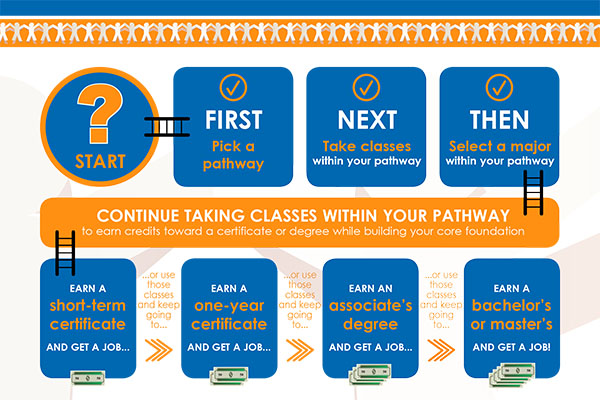
Two students, Erin and Tony, can’t see why they are in school. College is expensive, and besides, there are no jobs, they say. What’s the point? Erin and Tony think about dropping out when they turn 16. They are disconnected.
But there are great local entry level jobs in the Rogue Valley: places like Carestream Health,
which produces chemical coatings for medical imaging; Oregon Swiss Precision, a machining and
3-D printing company; Coding Zeal, where computer programmers build custom application
solutions; and Rogue Valley Microdevices, a manufacturer of microelectromechanical systems. These are just a few of the more than 400 high-tech production companies employing thousands of people in the Rogue Valley.
So why is it so hard for young people like Tony and Erin to know about and get those starting jobs in the Rogue Valley? Part of it is because they don’t have the right training. Nationwide, 46 percent of manufacturing employers say this is a significant problem. But it is also because young people just don’t know the jobs are there or how to get trained.
What if there were a pathway already prepared for Tony and Erin so that they knew about these companies, knew how to connect with them and could get the training they need? Wouldn’t they be inspired?
“Well, that is happening right now,” says Cathy Kemper-Pelle, president of Rogue Community
College. “There is a growing Business and education partner coalition in the Rogue Valley to align education with industry. We want to help students realize that manufacturing and production jobs aren’t boring; they’re cool, they pay well and there are lots of opportunities.”
It started in 2016 with the Southern Oregon Regional Economic Development Inc. (SOREDI) faculty externships that provided scholarships for teachers to learn about local businesses and how their students might connect.
“We asked for feedback at a breakfast meeting,” says organizer Dana Shumate, business manager, Rogue Workforce Partnership. “And the question was, ‘What do schools need from business, and what do businesses need from schools?’”
The lively and productive conversation that followed led to the formation of the Rogue Workforce Partnership, which is a shared community approach to align education and industry so that students get the education they need to achieve their dreams, whether it is career technical training or a four-year degree.
Brian Shumate, superintendent of the Medford School District, says the presence of this partnership in Southern Oregon is “vital for the future economic prosperity of the region, as well as fostering the alignment between the high school and post-secondary career and technical programs
with the future needs of business and industry.”
First, the partnership is identifying efforts that are already happening and bringing them together.
“This is a wonderful but siloed community,” says Dana Shumate. “We want to break those silos and get everyone together to collaborate on this same mission and grow our young people.” Next, the coalition is working with as many organizations as possible to create a system “that connects youth to careers,” says John Underwood of Timber Products Company, which has manufacturing locations in Medford, White City and Grants Pass. “Young students get visits to the college classrooms and labs, tours of manufacturing companies and eventually job shadowing and internship opportunities,” he says. “And the energy is there; people want to contribute to this partnership.”
This allows business and education to collaborate to develop learning that leads to workplace and technical skills. “Our students and teachers will benefit by having direct access to a variety of business and industry partners,” Brian Shumate says. “They can assist with enhancing our programs and providing more authentic experiences in the world of work.” Shumate adds that the presence of external partners will provide additional support and subsequent sustainability for career and technical programs in public schools.
The result is that students like Erin and Tony get exposure to many different Rogue Valley industries as early as middle school. They become inspired and develop a passion for something that gives purpose to their studies. Tony and Erin set a goal.
Then, in high school, they learn workplace skills and choose pathway classes that directly lead to the industry or field of study that interests them — and they discover what they need to succeed. They start taking career technical classes at their high school or Rogue Community College and spend time in maker spaces to develop skills. They are engaged and focused on their futures.
Finally, because high schools and higher education are working closely with local industry, they get connected to those businesses, often through internships. By then, Erin and Tony are ready to work and already connected to great entry-level jobs when they finish school.
“We have a shared goal,” says Kemper-Pelle. “And education cannot do it alone. This exciting partnership is a promising launch to truly building and connecting people to opportunity in the region. Rogue Community College is ready to work.”
If you would like to know more about this business and education partnership or want to participate, contact Dana Shumate at 541-842-2620.
